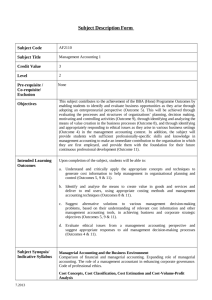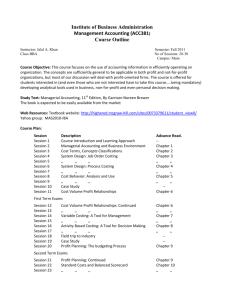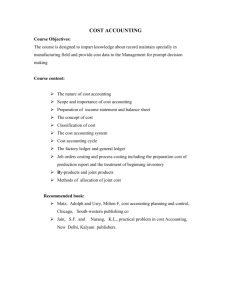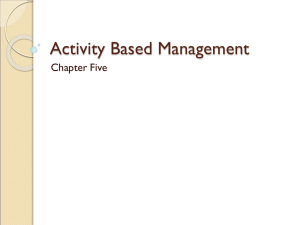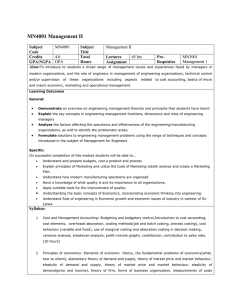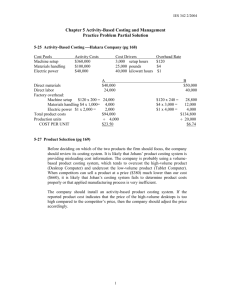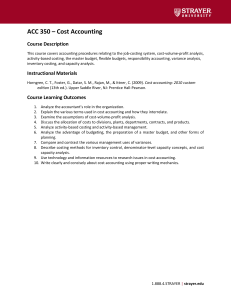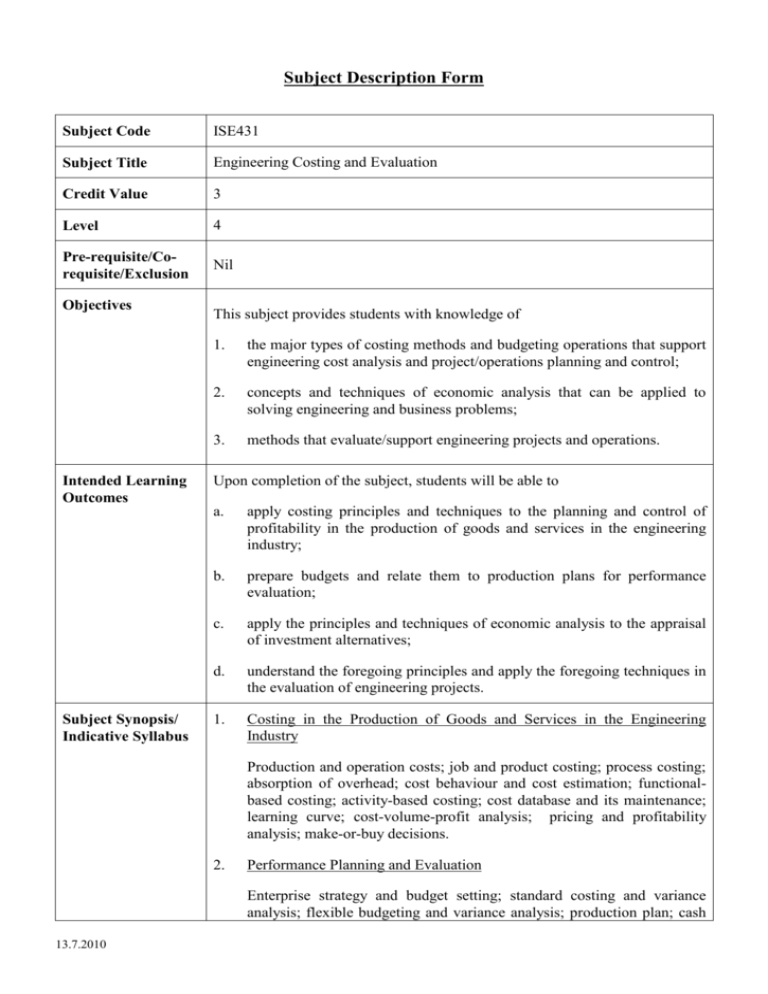
Subject Description Form
Subject Code
ISE431
Subject Title
Engineering Costing and Evaluation
Credit Value
3
Level
4
Pre-requisite/Corequisite/Exclusion
Nil
Objectives
Intended Learning
Outcomes
Subject Synopsis/
Indicative Syllabus
This subject provides students with knowledge of
1.
the major types of costing methods and budgeting operations that support
engineering cost analysis and project/operations planning and control;
2.
concepts and techniques of economic analysis that can be applied to
solving engineering and business problems;
3.
methods that evaluate/support engineering projects and operations.
Upon completion of the subject, students will be able to
a.
apply costing principles and techniques to the planning and control of
profitability in the production of goods and services in the engineering
industry;
b.
prepare budgets and relate them to production plans for performance
evaluation;
c.
apply the principles and techniques of economic analysis to the appraisal
of investment alternatives;
d.
understand the foregoing principles and apply the foregoing techniques in
the evaluation of engineering projects.
1.
Costing in the Production of Goods and Services in the Engineering
Industry
Production and operation costs; job and product costing; process costing;
absorption of overhead; cost behaviour and cost estimation; functionalbased costing; activity-based costing; cost database and its maintenance;
learning curve; cost-volume-profit analysis; pricing and profitability
analysis; make-or-buy decisions.
2.
Performance Planning and Evaluation
Enterprise strategy and budget setting; standard costing and variance
analysis; flexible budgeting and variance analysis; production plan; cash
13.7.2010
budget; profit plan; master budget; performance evaluation; balanced
scorecard and its implementation.
3.
Engineering and Project Economic Analysis
Cost and benefit concepts; worth measures and efficiency measures; time
value of money; capital budgeting and investment appraisal decisions;
financing methods; cost of capital; evaluation of project alternatives using
discounted cash flow methods; opportunity cost; lease versus buy
decisions; replacement and timing decisions; effects of tax and
depreciation; sensitivity and risk analysis in project evaluation.
4.
Engineering Evaluation
Technological forecasting; evaluation of technological innovation;
environmental cost evaluation and management. Process and the social
context of engineering decision making.
Teaching/Learning
Methodology
Assessment Methods
in Alignment with
Intended Learning
Outcomes
A mixture of lectures, tutorial exercises, and case studies is used to deliver the
various topics in this subject. Some material is covered using a problem-based
format where this advances the learning objectives. Other material is covered
through directed study to enhance the students’ self-learning abilities.
Tutorials, projects, and case studies are conducted mainly as group activities so
that students can discuss and practice the materials learnt in the class. This also
stimulates further thinking about the materials together with the factors to be
considered in solving problems related to the subject.
Specific assessment
methods/tasks
%
Intended subject learning outcomes to
weighting be assessed
a
b
c
d
1. Continuous
assessment
(Assignments/
Projects/Case
studies)
40%
2. Examination
60%
Total
100%
The assignments, projects, and case studies are designed to assess students’
capability to synthesise and apply the concepts and skills learnt in analysing
and solving engineering costing and evaluation problems.
The final examination assesses students’ understanding of the concepts and
their ability to apply the skills learnt to analysing and solving problems related
to the subject.
Student Study
13.7.2010
Class contact:
Effort Expected
Lectures
Tutorials/Case studies
2 hours/week for 13 weeks
26 Hrs.
13 Hrs.
1.5 hours/week for 8 weeks + 1 hour
Other student study effort:
Studying and self-learning
58 Hrs.
Assignment and report writing
26 Hrs.
Total student study effort
Reading List and
References
13.7.2010
123 Hrs.
1.
Hartman, J C 2007, Engineering Economy and the Decision-Making
Process, Upper Saddle River, N.J.: Prentice Hall
2.
Chan, S P 2012, Fundamentals of Engineering Economics, Upper Saddle
River, N.J.: Pearson/Prentice Hall
3.
Horngren, C T, Datar, S M & Foster, G 2011, Cost Accounting: a
Managerial Emphasis, Upper Saddle River, NJ: Pearson/Prentice Hall
4.
Rogers, M & Duffy, A 2012, Engineering Project Appraisal, Oxford:
Blackwell Science

